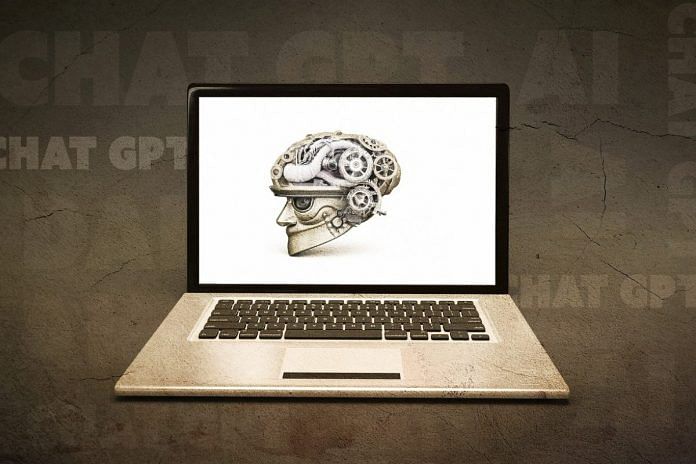New Delhi: The rise of ChatGPT following its launch on 30 November, 2022, was meteoric. This US-based OpenAI’s artificial intelligence powered tool, which can “interact in a conversational way”, became an instant hit with school students in the west. College students in India, too, started relying on it for their assignments. In fact, within the first week of the launch, the platform crossed the one million mark in terms of users.
However, months on, students ThePrint spoke to claim the language-based bot has started to lose its novelty.
Engineering students believe ChatGPT comes with exhaustive checks and question formation, owing to the need for asking pointed, accurate questions, making it cumbersome as they have to repeat commands sometimes. For humanities and research students, inaccurate references that the bot throws up makes it unreliable for mainstream use.
Viewing it as a threat to creativity, many American schools and Indian colleges banned the use of such AI-based tools on their campuses and several others switched back to the traditional pen and paper model to prevent plagiarism.
Meanwhile, cybersecurity experts say the tool calls for better policy regulations rather than a blanket ban.
Also read: Byju’s to Lido, India’s Edtech sector is leaking complaints. Unchecked power, no trust
Unreliable, old news
Rahul Pandey, a PhD student at Jawaharlal Nehru University, uses the AI bot as a last option when looking for additional reading material for his research. Narrating an instance where the bot failed him, he said, “My topic of study is Chinese domestic politics. In my search for additional foundational reading material, I sought the bot’s help. Of the three reference books listed in the search results, two did not exist.”
The second year doctoral student says the nature of results makes it highly unreliable as a means to ‘cheat’ or plagiarise work.
However, he says, the bot does help sift through important research material from the plethora of varied options that google provides. In addition to that, with under-resourced libraries, ChatGPT becomes a great help to procure research material in a matter of seconds.
Meenakshi Yadav, a third-year journalism student at Lady Shri Ram College, is of a similar opinion. She says the bot, which she discovered a month back, has been helping her finish her assignments on time while juggling her internship and studies.
She is, however, plagued by the ethical dilemma of using the bot for her assignments. She said, “As a student, I do have the moral responsibility of being honest with my work. Sometimes, I rewrite and restructure the content derived from the bot. It works as a learning experience for me.”
For engineering students, the bot quickly became the go-to tool for quick assignments, but because of its requirement for precise commands, it has lost its sheen and no longer seems like an exciting or easy way out.
A second semester computer science student at JNU says that about 30 per cent of his class is familiar with the tool. “In December and January — during mid-semester exams — we started using ChatGPT very heavily. It had become the new craze. But over time, we realised that searching for codes is a long, cumbersome process.” This, he said, was the reason why many of them turned to the bot.
Rahul, a student of International affairs, has another point. “The data fed to the bot is only till 2021. It has no knowledge of current affairs or implications of recent events, making its use pointless for students like me.”
What professors, experts say
The biggest talking point around this AI chatbot is that it enables students to get away with plagiarising assignments.
Turnitin, an internet-based plagiarism check platform run by a US company, has created a beta version tool that checks for AI-based plagiarism. Speaking about it, Chaitali Moitra, Regional Director-South Asia, Turnitin, said, “We are always in the process of building checks to identify any type of academic misconduct, including AI-written or plagiarised content.”
“AI writing tools are rapidly evolving, as is Turnitin’s technology to detect this form of academic misconduct. The technology is currently being developed in labs and is far along in the process. However, there is still some work to be done before it is ready for customers. We aim to deploy the same technology in our products by mid-2023. A crucial component of our model that distinguishes us from other AI writing detectors is that instead of using content that is publicly available, our model is trained specifically on academic writing that is sourced from a large database,” she added.
Indranil Chowdhury, economics professor with the PGDAV college of the Delhi University, says that Indian higher education institutions will not face a challenge with such chatbots till the time the age-old pen and paper continue to be the mode of evaluation.
He said, “I was first introduced to this tool by my teenage son. He and his friends were using it to finish their winter assignments for school. However, as a parent I have had to intervene and teach him the moral implications of cheating.”
“As a teacher, I feel if any of my students submit an essay-style assignment written off this tool, I have no means to detect it. Which is why I have completely stopped giving essays as assessment tools. I rely on class tests only,” he added.
(Edited by Smriti Sinha)
Also read: Overworked doctors, stressed students: How delay in NEET schedule every year is exacting a cost



